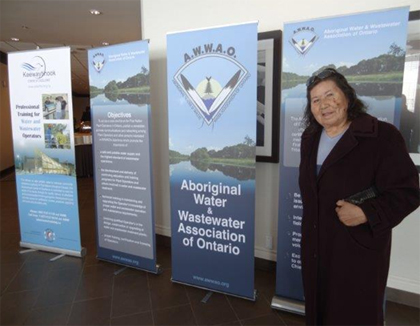The Water Walkers

By Beverly Sabourin and Peter Globensky
To someone who did not know her well, she might appear shy, even reticent. Her quiet and kindly demeanour, slightly dishevelled hair, gentle and reflective eyes and soft spoken manner is everything you would want and expect in a grandmother. But this is no ordinary Elder. Beneath that calm and calming exterior is a passion and commitment to bring attention to how we must respect and protect water – a life-sustaining resource she is convinced we take for granted. Wise well beyond her 74 years, Josephine Mandamin is a Water Walker. In the past 13 years, walking staff and trademark copper water bucket in hand, she and her fellow nature-keepers have walked around all five of the Great Lakes, which would be no mean feat for someone half her age! A resident of Thunder Bay, she moved here with her family from Wikwemikong Unceded Territory in northeastern Ontario and has spent a lifetime contributing to the well-being of First Nations peoples. She is currently president of Beendigen, a crisis home for Aboriginal women and a family healing agency in Thunder Bay.
When we spoke with her, she was about to depart on yet another water trek, this time to Wisconsin to bring attention to the plight of the Menomonee River and it was clear that while she may be slowing down in a few other areas of her life, issues relating to water have her moving full steam ahead. “Another Anishinaabe quay grandmother and I started Mother Earth Water Walkers about thirteen years ago,” she told us. “I was attending a Sun Dance ceremony in Pipestone and a message came to me loud and clear that we had to educate our own people and society at large on the vital importance of water and the need to respect its life-sustaining spirit. After all, as Aboriginal women or Anishinabe quay, we are the water carriers.” Mandamin decided that circling the lakes with her own spirit and those of other water walkers, meeting with as many community leaders, officials and with as many citizens groups as possible, would be a very personal way of drawing attention to both the state of our lakes and waterways and what we must do to protect them. She has participated in over 17,000 kilometers of water walks, organized and attended numerous conferences and symposia on water quality issues and reminded countless thousands of “the spirits living next door and providing us with what sustains our lives.”
Mandamin and her fellow water walkers supported by a crew of logistics personnel began with Gichigami – Lake Superior, “the most majestic of the Great Lakes – a lake that is at once powerful, treacherous, gentle and clear. A lake that has not yet been destroyed or polluted with chemicals and other toxic materials, a lake that reminds us how our water needs to be kept pristine.”
It is somewhat ironic that around the same time period when the idea of Mother Earth Water Walkers began to germinate, the Canadian Council of Environment Ministers was confronted with a challenge from a Malaysian tanker applying for a permit to extract bulk water from Lake Superior for sale abroad. Alarmed by the potential ecosystem impacts of the removal of such large quantities of water for sale abroad, the Canadian government eventually passed legislation prohibiting such exports. Great Lakes provinces and states have adopted similar measures.
Nearly 35 million people, a number equal to the population of Canada, live around the five great freshwater lakes. This number, coupled with the thousands of industries and agricultural enterprises which rely on the these water bodies for everything from adequate drinking water to sewage and chemical effluent treatment beg the question of how much is enough and where are the limits of ecosystem tolerance.
In February of this year, Josephine Mandamin was presented with the Ontario Heritage Trust award for Excellence in Conservation. A tribute to a remarkable, humble and powerful woman and Elder who, more than most, has walked her talk.
Beverly Sabourin is a member of the Pic Mobert First Nation and the recently retired Vice-Provost of Aboriginal Initiatives at Lakehead University. Peter Globensky is a former senior policy advisor on Aboriginal Affairs in the Office of the Prime Minister and retired as CEO of the Canadian Council of Ministers of the Environment. They invite your comments at basa1@shaw.ca


